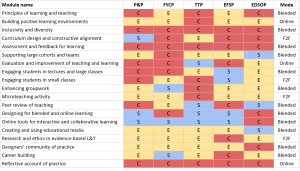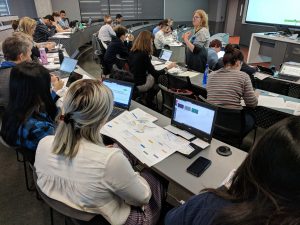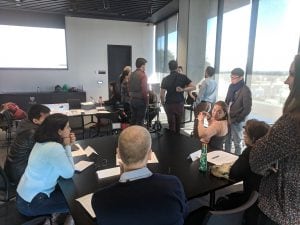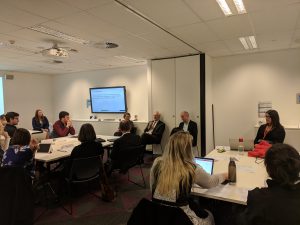The University’s newest training program for Sydney educators has changed the professional learning landscape from a single torrential river to a rich interconnected delta in more ways than one. River deltas are environmental melting pots where waters carrying nutrient-rich sediment converge, spreading the upstream nourishment over a broad area through interlocking channels. Over time, these large, dynamic landscape features cause the shoreline to advance, effectively building new land; this is fitting, since ‘delta’ is commonly used to mean ‘change’. But, putting aside our illusions of grandeur over a simple professional development program, what is it about this new ‘Modular Professional Learning Framework’ (MPLF) that has its participants and the University talking, how did we go about crafting this, and what are some of the outcomes to date (even though the MPLF is only 2 months old)?
Nutrient-rich sediment

The MPLF is comprised of 19 modules, so far. Each module is designed to take about 2 hours to complete, and may be completely online, completely face-to-face, or, more commonly, blended with some online work on either side of a face-to-face workshop. The 19 modules include professional learning stalwarts like ‘Principles of learning and teaching’, ‘Assessment and feedback for learning’, ‘Engaging students in lectures and large classes’, and ‘Designing for blended and online learning’. The modular nature of the MPLF has also allowed us to include modules that seek to address contemporary educational challenges such ‘Research & ethics in evidence-based learning and teaching’ or ‘Creating and using educational media’, as well as University strategic priorities such as ‘Inclusivity and diversity’, ‘Online tools for interactive and collaborative learning’, ‘Peer review of teaching’, and ‘Enhancing groupwork’.
Professional and academic staff at the University can take combinations of these modules to suit their interests and needs. Staff can take just one module if they’d like, or all of them, or take modules that form part of one of the five official ‘pathways’ through the MPLF. These modules and pathways have been designed in close collaboration with educational leadership in faculties and University schools to maximise their relevance and to address strategic priorities of the University. Each of the five pathways seeks to address the needs of five broad categories of university educator, including coordinators, educational support staff, and new/returning educators.
| Pathway | Typically for … | To … |
| Principles and Practice pathway | Anyone involved in learning and teaching, typically taken as a probation requirement for staff new to the University. | Introduce evidence-based learning and teaching best practices and contextualise teaching at Sydney |
| First Year Coordinators pathway | Coordinators of first-year units who have not taken this program before or are new to the role | Equip coordinators with the skills to manage, teach and support first-year cohorts and teaching teams |
| Tutor Training pathway | Sessional staff who are new to teaching in tutorials, laboratories, seminars and other smaller classes | Upskill staff in innovative and engaging small class teaching approaches and in giving effective feedback |
| Education-Focused Support pathway | Academic staff in education-focussed roles | Support academics in improving their teaching and advancing their career |
| Educational Designer and Support Officer pathway | Faculty and centrally-based educational designers and educational support officers. | Upskill staff in the use of educational technologies, introduce new technologies and approaches and share best practice |
Through a series of core, selective, and elective modules, each pathway offers a recommended collection of modules for each of these staff. To complete a pathway, staff must complete all ‘core’ (compulsory) modules (typically 8), choose 2 out of 3-4 ‘selective’ (highly recommended) modules, and complete a set of 12 modules from remaining electives and selectives. These modules and pathways represent the collected and connected nutriments from upstream.
Upstream nourishment
Isaac Newton infamously said, “If I have seen further it is by standing on the shoulders of giants”. In building the MPLF, we have drawn from many upstream sources and resources developed by educational researchers and practitioners with far greater insight and experience than ourselves. Some of the MPLF modules have been adapted from sessions that have been historically run as part of the University’s Principles and Practices of University Teaching and Learning and First Year Coordinator programs. These programs have now been absorbed into the MPLF, which has been a mixed blessing: while they have saved some development time in the 4-month lead-time to program delivery, they are well-established in the institutional landscape and so presented challenges in moving staff away from a fixed pathway model – we discuss this a bit further down.
We have also had the privilege of working with colleagues from across the University in developing and delivering certain modules. The MPLF draws from existing expertise such as in the scholarship of teaching and learning (e.g. Rachel Wilson from the Sydney School of Education and Social Work), assessment (e.g. Nesrine Basheer from the School of Languages and Culture), small class engagement (e.g. Stephanie Wilson and Robyn Martin from the Sydney Business School), curriculum design (e.g. Samantha Haley from the Faculty of Science), peer review and career advancement (e.g. Melanie Hayes from the Education – Enterprise and Engagement team), academic integrity (e.g. Rebecca Dinnie from Educational Integrity), and student support (e.g. Lakia Turner from Student Support Services).

Moreover, in developing the MPLF, we have been inspired by and indebted to colleagues from across the sector who have produced and publicly-shared their research and professional learning resources. There are too many to provide a complete list here, but here are some that have substantially influenced parts of the MPLF and are well worth your time:
- ANU’s Coffee Courses, particularly their approach to online learning and resources on all things good in higher education learning and teaching
- Swinburne University of Technology’s Contemporary Approaches to University Teaching MOOC
- University of Melbourne Centre for Studies on Higher Education, particularly their resources on digital media, student wellbeing
- Deakin University’s Centre for Research in Assessment and Digital Learning, particularly their approaches and outputs relating to assessment, feedback, and evaluative judgement
- The Science of Learning Research Centre, particularly their Higher Education Learning Framework
- The Assessment Decisions Design Framework
- The ABC Learning Design approach, which has informed key storyboarding activities in the blended and online learning design module
- CAST’s Universal Design for Learning resources, which permeate a number of modules including those on learning design and inclusivity
- learningscientists.org, whose accessible resources are readily applied
- Deans for Impact, particularly their science of learning resources
- The Chronicle of Higher Education, Faculty Focus, and many others who have distilled and curated good practice
- and many others
We are in the fortunate position to be able to draw from these strong evidence-based resources to nourish and grow the MPLF and professional learning at Sydney.
Interconnected channels
One of the main developments with the MPLF is that professional learning for educational innovation is no longer one-size-fits-all. One of the key pieces of negative feedback we received as part of the now-replaced Principles and Practices Program (P&P), which new teaching staff are required to complete, was that it did not feel customised or particulary relevant to a range of educators’ needs. This was held as a central tenet in the design of the MPLF: in deconstructing P&P and a few other professional learning programs that we ran, we discovered that there were discrete but interconnected topics which could form building blocks for educational excellence, tailored to individual needs. These eventually became the modules of the MPLF.

Because our faculties and University schools also had existing bespoke training, we wanted to maximise the supporting benefits of a centrally-run MPLF. In consultation with educational leadership, there are a number of ‘faculty swaps’ where, for each faculty or University school, completion of faculty/school-internal training sessions can be recognised as (essentially, taking the place of) completion of MPLF modules. This allows, for example, a faculty to specify internal training sessions on peer review, assessment, and elearning, such that staff from that faculty then only need to complete a reduced set of MPLF modules to complete an MPLF pathway. This interconnected approach models Sydney’s new approach to undergraduate and postgraduate curriculum, with flexible and extensible course components.
Staff can now carve their own pathway through the professional learning landscape, criss-crossing the MPLF delta to engage with tailored development needs.
Dynamic and advancing
The modular nature of the MPLF is designed to allow a dynamicity for responding to changing institutional and sectoral trends and needs. For example, we are now working with the University’s National Centre for Cultural Competence to develop the 20th MPLF module on engaging and supporting international students. As needs change, there is flexibility to drop modules in and out of the MPLF and its pathways.
Throughout the development and delivery of the MPLF, we have also closely aligned the modules and pathways to the UK Higher Education Academy’s Professional Standards Framework. In doing so, we seek to ensure that any training that staff receive through the MPLF is connected to international standards and that this training can be transferable and internationally relevant. Moreover, as we seek to integrate the MPLF with the University’s set of accredited provisions with Advance HE, our educators will be able to receive an internationally-recognised credential to affirm their commitment to promoting learning and teaching.
As natural river deltas advance the shoreline as earth flows from upstream, our hope is that the MPLF will also not only advance the capabilities and careers of educators at Sydney, but also strengthen our collective educational innovation and excellence.
Challenges and outcomes so far
One of the main challenges in socialising the MPLF has been in helping staff to grapple with its modular nature. The traditional approach has been well-enculturated, and staff were expecting a ‘single sign up’ where they would be told which sessions to complete. We have sought to produce a number of guidance resources such as FAQs and online guides to help staff navigate the complexity of the MPLF, and a sign-up portal which is integrated into the MPLF Canvas site presents each module independently. We’re hoping that this perspective will change over time. An automated ‘Track my progress’ portal embedded into the Canvas site also helps participants better understand their progress towards completion of each module and pathway.

A corollary of modularisation and flexibility is a reduced cohort identity. While we used to run a fixed two-day program before the start of each semester, now with the MPLF participants can come and go as they choose. We have tried to address this through running an ‘MPLF Intensive’, which is 2-3 consecutive days where half of all the modules are covered, especially the cores, to bring more participants together at the same time. Through modelling techniques of building positive classroom environments such as using name tents in all sessions and a strong emphasis on collaborative and interactive learning, we are hoping to connect participants more strongly with each other and the facilitators.
As do all educators, we are still learning and adapting the teaching approaches within the MPLF modules and sessions. While we are encouraged by the reduced prevalence of comments so far about lack of relevance, the structure, content, and active components of each module need continual tweaking – some more than others! Some activities have taken much longer than expected, and we have been surprised by many pieces of feedback that have suggested even more time be spent on hands-on design activities and even calls for longer sessions. Another tricky balance to strike is between providing a strong theoretical and evidence base, and practical application. Some participants have even suggested increased front-loading of particular concepts into pre-work, which is already being completed to an impressive degree.
Have we been successful? It’s far too early to tell, but initial signs are positive. We are seeing high-quality engagement with pre- and post-session tasks, and 94% of survey respondents (n=176) so far in the 2 months have indicated that what they have learned in their selected module(s) will be useful for their teaching activities. Just in these two months, we have delivered 14 face-to-face sessions to over 300 attendees, with over 800 registered over this semester. Comments have included:
- “Really made me think about how to convey my knowledge, and also to implement some ‘active learning’ strategies. Fantastic. Can’t wait to change all my lectures!”
- “The unit design exercise using the cards with the UDL principles is really useful to clarify the learning process and align it with content.”
- “I learned so much! Really great. I’m going to be using some of the tips, some of which I was aware of, but not clear about, in my upcoming courses”
- “Got me thinking more about my own teaching style and how it could be improved. Broadened my idea of what are relevant goals / qualities of good teaching.”
- “I was a bit skeptical prior to starting, but it’s all really terrific.”
Tell me more!
- University of Sydney staff – professional and academic – are invited to sign up for the MPLF.
- Members of the wider University community are welcome to get in touch with Danny and Sam for more information.
- Check out this neat video summarising the MPLF:






7 Comments